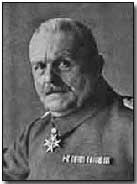Who's Who - Remus von Woyrsch
 Field Marshal Remus von Woyrsch
(1847-1920) was recalled from retirement by the German Army in August 1914
to resume a military career that eventually concluded in December 1917 with
his promotion to Field Marshal and retirement at his own request.
Field Marshal Remus von Woyrsch
(1847-1920) was recalled from retirement by the German Army in August 1914
to resume a military career that eventually concluded in December 1917 with
his promotion to Field Marshal and retirement at his own request.
Woyrsch entered the Prussian Army in 1860. Within the course of the following decade he saw active service in two wars: against Austria in 1866 and France in 1870-71, both victorious Prussian campaigns.
Thereafter joining the General Staff Woyrsch had reached the rank of Brigadier-General by 1901 with command of 12th Division. During 1903-04 he led VI Corps at Breslau and a year later, in 1905, he was further promoted to Lieutenant-General. In 1911, at the age of 64, he retired from the army.
With his experienced infantry background Woyrsch was recalled from retirement on the outbreak of war in August 1914 and handed command of the Silesian Landwehr corps on the Eastern Front.
His force was for a period seconded to the Austro-Hungarian First Army, where he served with distinction at Rava Russka, saving First Army from demolition by covering Viktor Dankl's retreat at the cost of 8,000 of his own men. He was then appointed at the head of the newly-created Army Group Woyrsch in Silesia in October 1914.
Between October 1914 and August 1916 Woyrsch served in the offensive against Russia, achieving notable victories at Thorn (which led to his promotion to full General) and at Sienno in June 1915.
Posted to Poland in August 1916, Woyrsch's army group remained in the south of the country until the end of 1917 and Russia's military collapse (and subsequent withdrawal from the war). During this period Woyrsch inflicted a stinging defeat upon General Alexei Evert in the midst of the Russian Brusilov Offensive of June 1916.
With his force disbanded in December 1917 Woyrsch was made Field Marshal and returned to retirement at his own request (in light of his age). After the armistice he was given command of the southern area of German border guards. He died in 1920.
"Beachy Bill" was the name given to one of the Turkish guns which regularly shelled Anzac Cove.
- Did you know?
